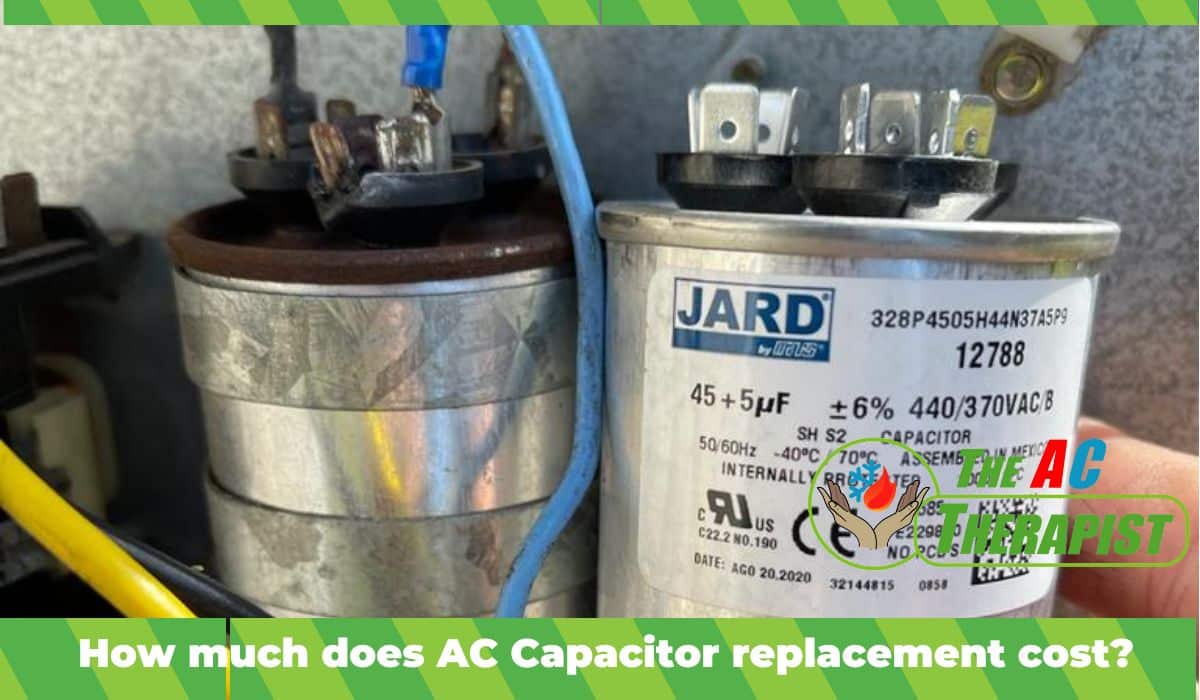How much does AC Capacitor replacement cost?
Air conditioners have become an indispensable part of our lives, providing comfort during those sweltering summer months.
An essential component of an air conditioning system is the AC capacitor, which ensures the smooth and efficient functioning of the unit.
Over time, capacitors can wear out, leading to poor performance or even a complete breakdown of the AC system.
In this blog, we’ll explore the costs associated with replacing an AC capacitor, factors that influence the price, and some tips to ensure you’re getting the best deal possible.
Short Answer: Between it costs $180 and $240 to replace a capacitor.
What is an AC Capacitor and Why is it Important?
An AC capacitor is a small, cylindrical device that stores and releases electrical energy to help start and run the motors in your air conditioning system. These motors include the compressor, the blower motor, and the outdoor fan motor. The capacitor essentially provides the initial boost needed to start the motor and maintains a steady flow of energy to keep it running.
Over time, capacitors can degrade, losing their ability to store and release energy effectively. This can result in several issues, such as the air conditioner not turning on, weak airflow, or the unit struggling to cool your home. Replacing a faulty capacitor is crucial to restoring the optimal functioning of your AC system.
Estimated Costs of AC Capacitor Replacement
The estimated cost to replace an AC capacitor takes into account several factors that can influence the overall price. Here’s a detailed breakdown of the components contributing to the cost:
- Capacitor Cost: The cost of the capacitor itself typically ranges from $10 to $100, depending on the type, capacity, and quality of the capacitor. There are two main types of capacitors: start capacitors and run capacitors. Start capacitors provide a temporary boost to start the motor, while run capacitors maintain a consistent voltage supply for the motor’s operation. Start capacitors are generally more expensive than run capacitors. Capacitors with higher capacity (measured in microfarads, or µF) will also cost more. Additionally, the brand and quality of the capacitor can significantly impact the price, with top-tier brands offering better performance and durability at a higher cost.
- Labor Costs: The cost of labor for AC capacitor replacement varies based on factors such as the complexity of the job, the technician’s experience, and your geographical location. Generally, labor costs range from $50 to $150 per hour. The replacement process itself usually takes about an hour to complete, but this can vary depending on the specific situation.
- Service Call Fee: HVAC professionals often charge a service call fee, which covers the cost of the technician’s visit to your home. This fee is separate from labor costs and can range from $50 to $100. Keep in mind that some professionals may waive the service call fee if you choose to have the capacitor replaced by them.
Considering these factors, the total estimated cost for replacing an AC capacitor can range from $180 to $240. However, it’s essential to note that these costs can vary significantly depending on your unique circumstances. To get an accurate estimate for your specific situation, it’s recommended to contact multiple HVAC professionals for quotes and compare their prices and services.
It’s also worth mentioning that regular maintenance of your AC system, including capacitor inspections, can help prolong the life of the capacitor and prevent unexpected breakdowns. Scheduling annual maintenance with a professional HVAC technician is a proactive approach to keeping your system in optimal condition and potentially reducing the need for capacitor replacement.
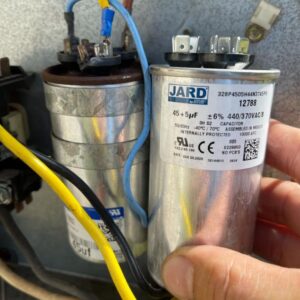
How to replace your AC’s Capacitor:
Before attempting to replace your AC capacitor, please note that working with electrical components can be dangerous, especially if you have no experience. If you’re not comfortable with this process, it’s best to call a professional HVAC technician. However, if you decide to proceed, follow these steps to replace your AC capacitor:
- Gather tools and materials: You’ll need a multimeter, a screwdriver or nut driver, a wrench, a digital camera or smartphone (optional), and a compatible replacement capacitor.
- Turn off power to the unit: Shut off the power to your air conditioning unit at the circuit breaker or the unit’s disconnect box, typically located near the outdoor compressor.
- Open the access panel: Locate the access panel on your outdoor unit and use a screwdriver or nut driver to remove the screws securing the panel. Carefully remove the panel to expose the capacitor.
- Discharge the capacitor: Capacitors can hold an electrical charge even after the power is disconnected. To discharge the capacitor, place an insulated screwdriver across the terminals, connecting them together. This will safely release the stored charge. Be careful not to touch the metal part of the screwdriver during this process.
- Document wiring connections: Use a digital camera or smartphone to take a picture of the wiring connections, or make a note of the connections to ensure proper reassembly.
- Remove the old capacitor: Disconnect the wires from the capacitor’s terminals by gently pulling on the connectors. If they’re stuck, use needle-nose pliers to wiggle them loose. Then, remove the capacitor by loosening the strap or bracket holding it in place with a wrench or nut driver.
- Install the new capacitor: Place the new capacitor in the same position as the old one and secure it with the strap or bracket. Refer to the photo or notes you took earlier and reconnect the wires to the appropriate terminals on the new capacitor. Make sure the connections are tight and secure.
- Close the access panel: Replace the access panel, securing it with the screws you removed earlier.
- Restore power: Turn the power back on at the circuit breaker and the unit’s disconnect box.
- Test the unit: Turn on your air conditioner and observe its performance. The unit should start up smoothly and cool your home effectively. If you notice any issues, consult a professional HVAC technician for assistance.
Remember that working with electricity and HVAC systems can be dangerous if you’re not experienced. When in doubt, it’s always best to consult with a professional HVAC technician to ensure your safety and the proper functioning of your air conditioning system.
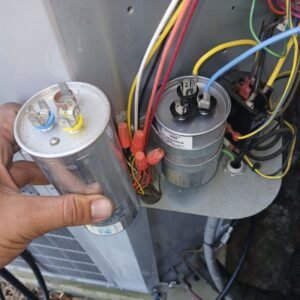
What happens when an AC capacitor goes bad?
When an AC capacitor goes bad, it can cause various issues with your air conditioning system, as the capacitor plays a crucial role in starting and running the motors. Some common problems that can arise when an AC capacitor goes bad include:
- Difficulty starting: A faulty capacitor might not provide the required energy boost for the motors, such as the compressor, blower motor, and outdoor fan motor, to start. This can result in the air conditioner not turning on or struggling to start.
- Reduced cooling efficiency: If the capacitor isn’t functioning correctly, the motors may not receive a steady flow of energy to run efficiently. This can lead to the air conditioner not cooling your home effectively, making it uncomfortable during hot weather.
- Inconsistent airflow: A bad capacitor can affect the blower motor, which is responsible for circulating cool air throughout your home. If the blower motor isn’t functioning correctly, you may experience weak or inconsistent airflow from your air vents.
- Increased energy consumption: When the motors in your air conditioning system don’t receive adequate power from the capacitor, they may work harder to compensate. This can result in increased energy consumption and higher utility bills.
- Overheating and system damage: In some cases, a bad capacitor can cause the motors to overheat or other components to fail, leading to more severe damage to your air conditioning system. This can result in costly repairs or even the need for a complete system replacement.
If you suspect your AC capacitor has gone bad, it’s essential to address the issue promptly to avoid further damage and restore your air conditioner’s performance. Contact a professional HVAC technician to diagnose and resolve the problem.
Can I run my AC without a capacitor?
When the capacitor is missing or not functioning correctly, several issues can arise in the air conditioning system. The capacitor is designed to provide an initial surge of power, known as the starting torque, which is required to start the motors in the AC unit. Additionally, the capacitor helps to maintain a stable voltage supply, which is crucial for the efficient operation of the motors.
Attempting to operate an AC system without a capacitor can result in the following problems:
- Failure to start: Since the capacitor is responsible for providing the initial boost of power to start the motors, the absence of a capacitor can prevent the motors from starting at all. This means your air conditioner will not turn on or function.
- Damage to motors: The lack of a capacitor can cause the motors to strain and overheat, as they will not receive the starting torque or the steady voltage supply necessary for efficient operation. Over time, this can lead to premature wear and tear on the motors and eventually cause them to fail.
- Reduced energy efficiency: When the motors are not receiving the proper voltage supply from the capacitor, they may consume more energy to compensate for the lack of starting torque and a stable voltage. This can lead to higher energy bills and increased strain on the electrical system.
- Increased wear on other components: The absence of a capacitor can also affect other components in your air conditioning system, such as the contactor or the control board, which may experience increased wear and tear due to the motors not starting or running correctly.
- Decreased lifespan of the system: Overall, running an AC system without a capacitor can shorten the lifespan of the entire system, leading to more frequent repairs and potentially requiring a full system replacement sooner than expected.
To avoid these issues and ensure the proper functioning of your air conditioning system, it’s crucial to have a functioning capacitor in place. If you suspect a problem with your capacitor, consult with a professional HVAC technician to diagnose and address the issue promptly.
How often do AC capacitors go bad?
The lifespan of an AC capacitor can vary depending on factors such as the quality of the capacitor, the environmental conditions it is exposed to, and the maintenance of the overall system. In general, a capacitor typically lasts anywhere from 3 to 10 years, with higher-quality capacitors more likely to last towards the higher end of that range.
Several factors can impact the lifespan of an AC capacitor:
- Quality: High-quality capacitors from reputable manufacturers are more likely to have a longer lifespan. Cheaper, lower-quality capacitors may fail sooner.
- Heat exposure: Capacitors are sensitive to heat, and exposure to high temperatures can cause the dielectric material to break down, shortening the capacitor’s lifespan. Proper ventilation and shade can help reduce heat exposure and prolong the life of the capacitor.
- Voltage fluctuations: Frequent voltage fluctuations or power surges can stress the capacitor and cause it to degrade more quickly. Installing a voltage stabilizer or surge protector can help protect your AC system from these fluctuations.
- System maintenance: Regular maintenance of your AC system, including cleaning and inspection of components, can help prolong the life of the capacitor. A well-maintained system reduces strain on the capacitor and other components, extending their lifespan.
- Overuse: Running your AC system continuously for extended periods can put additional strain on the capacitor, leading to a shorter lifespan. Allowing your system to have some downtime and using it efficiently can help extend the life of the capacitor.
While it’s difficult to predict exactly when an AC capacitor will go bad, you can help prolong its life by ensuring proper maintenance and care of your air conditioning system. If you notice signs of a failing capacitor, such as difficulty starting the AC unit, decreased cooling efficiency, or unusual noises, it’s essential to contact a professional HVAC technician to diagnose and address the issue.
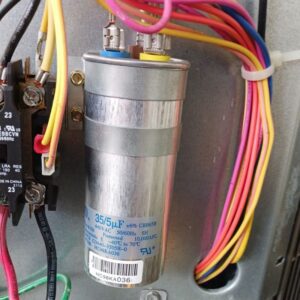
Can a bad capacitor ruin a compressor?
Yes, a bad capacitor can potentially ruin a compressor in an air conditioning system. The capacitor plays a crucial role in providing the initial boost of power, known as the starting torque, required for the compressor to start. It also helps to maintain a stable voltage supply during the compressor’s operation. If the capacitor is faulty or fails, it can lead to the following issues with the compressor:
- Hard starting or failure to start: A bad capacitor may not provide the necessary starting torque for the compressor to start. This can result in hard starting, where the compressor struggles to start and may draw excessive current, or complete failure to start.
- Overheating: When a capacitor is not functioning correctly, the compressor may overheat due to the increased effort required to start and run without the necessary power support. Overheating can cause damage to the compressor’s internal components, including the windings and bearings, leading to premature failure.
- Increased wear and tear: A compressor that frequently struggles to start or experiences voltage fluctuations due to a bad capacitor will experience increased wear and tear on its components. Over time, this can lead to reduced efficiency, breakdowns, and the need for more frequent repairs or even replacement.
- Potential electrical issues: A faulty capacitor can cause the compressor to draw excessive current, leading to potential electrical issues such as tripped circuit breakers, blown fuses, or even damage to other electrical components in your air conditioning system.
To prevent damage to your compressor and ensure the proper functioning of your air conditioning system, it’s crucial to address any issues with the capacitor promptly. If you suspect a bad capacitor, consult with a professional HVAC technician to diagnose and resolve the problem. Regular maintenance of your AC system, including capacitor inspections, can also help prevent unexpected breakdowns and prolong the life of the compressor and other components.
Will the compressor fan run if the capacitor is bad?
If the capacitor connected to the compressor fan motor is bad, the fan may struggle to start or not start at all. Capacitors are crucial for providing the initial burst of energy required to start the motor and maintaining a stable voltage supply during operation. In an air conditioning system, there are typically separate capacitors for the compressor and the fan motor, although some systems use a dual capacitor that serves both components.
When the fan motor capacitor is bad or failing, you might experience the following issues:
- Difficulty starting: The fan may struggle to start, or it may not start at all due to the lack of starting torque provided by the faulty capacitor.
- Reduced fan speed: If the capacitor is unable to maintain a stable voltage supply to the fan motor, the fan may run at a reduced speed, affecting the overall efficiency and cooling capacity of the air conditioning system.
- Overheating: The fan motor may overheat due to the increased effort required to start and run without the necessary power support from the capacitor. Overheating can lead to damage to the fan motor, reducing its lifespan and potentially causing complete failure.
- Intermittent operation: A faulty capacitor might cause the fan motor to operate intermittently, stopping and starting at random intervals.
It’s important to note that if the fan motor doesn’t run or runs inefficiently due to a bad capacitor, the overall performance of the air conditioning system will be affected. This can lead to reduced cooling capacity, increased energy consumption, and potential damage to other components, such as the compressor, due to overheating.
If you suspect that your fan motor capacitor is bad or failing, it’s crucial to consult a professional HVAC technician to diagnose and resolve the issue. Regular maintenance of your AC system, including capacitor inspections, can help prevent unexpected breakdowns and prolong the life of the fan motor and other components.
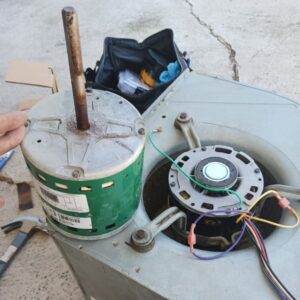
Capacitor Problems? Call Tampa Bay’s #1 AC Repair Company: The AC Therapist
Replacing an AC capacitor is an essential part of maintaining the optimal functioning of your air conditioning system. Understanding the factors that influence the cost of replacement can help you budget accordingly and ensure you’re getting the best deal possible. By shopping around, considering DIY replacement, and investing in regular maintenance, you can save money and keep your AC system running smoothly.
Remember that working with electricity and HVAC systems can be dangerous if you’re not experienced. When in doubt, it’s always best to consult with a professional HVAC technician to ensure your safety and the proper functioning of your air conditioning system.
Partnering with The AC Therapist is the smart choice for maintaining your cooling system’s performance and efficiency. Our team of skilled professionals will ensure your AC capacitor replacement is done right, extending your system’s lifespan and saving you money in the long run. Don’t let the heat get the best of you – trust the AC Therapist for a cooler, more comfortable home. Let us be your go-to experts for all your air conditioning needs.

